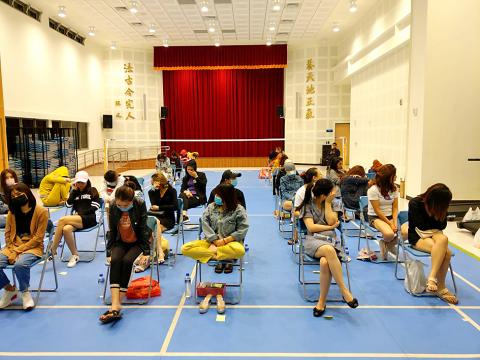A total of 52 people, including 36 foreigners, were arrested on Thursday during a raid on a sex trafficking operation in Taipei, police said yesterday.
Acting on a tip-off, a team of about 100 police officers surrounded a building on Kangding Road in the city’s Wanhua District (萬華) at 6pm before entering with search and arrest warrants, police officials told a media briefing.
During the raid, 10 Taiwanese suspected of operating the sex trafficking ring were arrested, along with 42 suspected sex workers — 28 from Thailand, six from Vietnam, two from China and six Taiwanese, police said.

Photo courtesy of the Taipei City Police Department via CNA
Police also seized accounting ledgers and other evidence from the scene, said Chen Wei-jen (陳偉仁), head of an investigation squad at the Wanhua Precinct.
The 10 Taiwanese suspected of running the prostitution ring have been handed over to the Taipei District Prosecutors’ Office for investigation, while the foreign suspected sex workers are being held in detention by immigration authorities pending deportation based on the findings of the probe, Chen said.
The six Taiwanese suspected sex workers would be charged under the Social Order Maintenance Act (社會秩序維護法), Chen added.
The foreigners entered Taiwan on tourist visas and were inhumanely exploited by the sex trafficking ring, police said.
The alleged sex traffickers were luring women from overseas to Taiwan with offers of work at massage and beauty parlors, but were coercing them into prostitution on arrival, police said.

MORE VISITORS: The Tourism Administration said that it is seeing positive prospects in its efforts to expand the tourism market in North America and Europe Taiwan has been ranked as the cheapest place in the world to travel to this year, based on a list recommended by NerdWallet. The San Francisco-based personal finance company said that Taiwan topped the list of 16 nations it chose for budget travelers because US tourists do not need visas and travelers can easily have a good meal for less than US$10. A bus ride in Taipei costs just under US$0.50, while subway rides start at US$0.60, the firm said, adding that public transportation in Taiwan is easy to navigate. The firm also called Taiwan a “food lover’s paradise,” citing inexpensive breakfast stalls

TRADE: A mandatory declaration of origin for manufactured goods bound for the US is to take effect on May 7 to block China from exploiting Taiwan’s trade channels All products manufactured in Taiwan and exported to the US must include a signed declaration of origin starting on May 7, the Bureau of Foreign Trade announced yesterday. US President Donald Trump on April 2 imposed a 32 percent tariff on imports from Taiwan, but one week later announced a 90-day pause on its implementation. However, a universal 10 percent tariff was immediately applied to most imports from around the world. On April 12, the Trump administration further exempted computers, smartphones and semiconductors from the new tariffs. In response, President William Lai’s (賴清德) administration has introduced a series of countermeasures to support affected

CROSS-STRAIT: The vast majority of Taiwanese support maintaining the ‘status quo,’ while concern is rising about Beijing’s influence operations More than eight out of 10 Taiwanese reject Beijing’s “one country, two systems” framework for cross-strait relations, according to a survey released by the Mainland Affairs Council (MAC) on Thursday. The MAC’s latest quarterly survey found that 84.4 percent of respondents opposed Beijing’s “one country, two systems” formula for handling cross-strait relations — a figure consistent with past polling. Over the past three years, opposition to the framework has remained high, ranging from a low of 83.6 percent in April 2023 to a peak of 89.6 percent in April last year. In the most recent poll, 82.5 percent also rejected China’s

PLUGGING HOLES: The amendments would bring the legislation in line with systems found in other countries such as Japan and the US, Legislator Chen Kuan-ting said Democratic Progressive Party (DPP) Legislator Chen Kuan-ting (陳冠廷) has proposed amending national security legislation amid a spate of espionage cases. Potential gaps in security vetting procedures for personnel with access to sensitive information prompted him to propose the amendments, which would introduce changes to Article 14 of the Classified National Security Information Protection Act (國家機密保護法), Chen said yesterday. The proposal, which aims to enhance interagency vetting procedures and reduce the risk of classified information leaks, would establish a comprehensive security clearance system in Taiwan, he said. The amendment would require character and loyalty checks for civil servants and intelligence personnel prior to